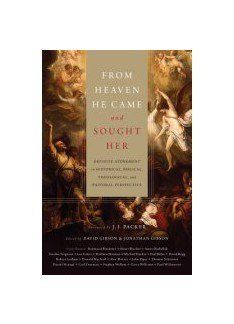From heaven he came and sought her
Ed. D. & J. Gibson
Crossway Books, 704 pages, hardcover £27.19 (Kindle £10.99)
ISBN: 978-1-4335-1276-6
Star rating : 5
This book is a landmark contribution to the current debate surrounding particular redemption. Since the Synod of Dort, discussion regarding the extent and intent of the atonement has rumbled on. Each new generation needs to grapple with and understand the truth of Scripture.
It is fitting that J. I. Packer wrote the foreword, as he also penned the introduction to a modern release of John Owen’s seventeenth-century classic on the same subject, The death of death in the death of Christ. This new book has been written to engage in the debates that have ensued since Owen’s thesis was let loose on the theological world several centuries ago.
The editors have involved erudite, Reformed scholars and the list of contributors is impressive indeed; Carl Trueman, J. Alec Motyer, Sinclair Ferguson and John Piper are among them.
Motyer’s chapter is, perhaps, my favourite; it is a comprehensive exposition of the Servant Song in Isaiah 52-53. It is entitled ‘Stricken for the transgression of my people’ and Motyer anchors definite atonement in the biblical text in a way that is refreshing.
Arranged as it is around four loci, the book contains common threads running throughout. Definite atonement in church history; definite atonement in the Bible; definite atonement in theological perspective; and definite atonement in pastoral practice are the four divisions.
Preference for the term definite atonement is favoured instead of limited atonement or particular redemption.
Most contributors write in an academic style, which may be too esoteric for some readers to easily understand. There is strong polemic in each chapter and specific opponents of definite atonement are often countered.
The book is written with clarity and acumen and also boldness. For example, Piper exposes the flawed understanding of the atonement that is propounded by Mark Driscoll of Mars Hill Church in Seattle, revealing the latter’s theology as carrying unreformed and unorthodox strands.
I am persuaded this book will endure the test of time and buttress the church to stand firm on the historic truths concerning the atonement. After reading these many pages, I sought refuge in the distilled sentences of the Westminster Confession concerning this subject: ‘To all those for whom Christ has purchased redemption, he does certainly and effectually apply and communicate the same … revealing unto them, in and by the Word, the mysteries of salvation’ (8:8).
Kevin Bidwell
Sheffield








